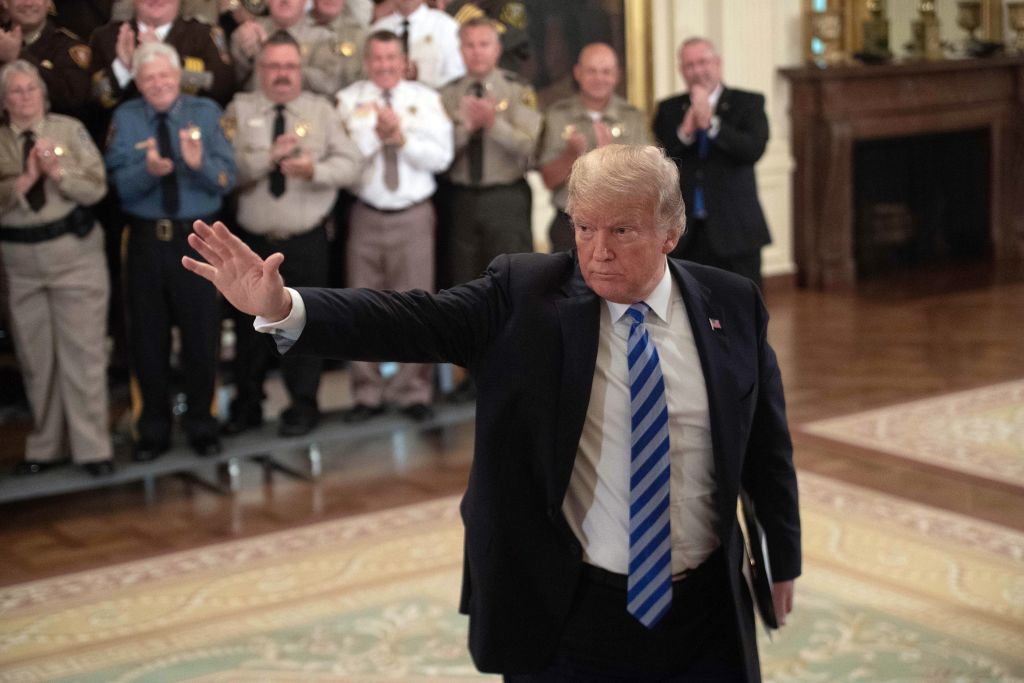There is a monumental hypocrisy at the heart of NeverTrump Republicanism. The president’s critics in his own party say that Trump is a danger to American institutions and the rule of law. Yet time and again, these opponents bend and break the rules of institutions stretching from the Republican Party to the federal government in an effort to sabotage the regular political process — a process whereby Republicans, and Americans in generals, have consistently repudiated the NeverTrumpers. They can’t win elections, so they can’t govern constitutionally. But they do everything in their power to seize the machinery of party and state nevertheless.The latest example of this is an anonymous opinion piece in the New York Times by a purported ‘senior administration official,’ who boasts that he and other unelected officials ‘are working diligently from within to frustrate parts of [Trump’s] agenda and his worst inclinations.’ Such undemocratic and potentially illegal activity on the part of the author is characterised as an effort to ‘preserve our democratic institutions while thwarting Mr. Trump’s more misguided impulses until he is out of office.’ Even some of the president’s harshest critics among the pundit class, such as David Frum, have called this what it is: a virtual coup.Extreme times might call for extreme measures, but the justification offered for this usurpation is not a national emergency — the country, after all, is enjoying a booming economy and domestic tranquility, if not exactly partisan harmony — but ideological cant. Trump has sinned against Cartesian political rationalism: he is ‘not moored to any discernible first principles’ and ‘shows little affinity for ideals long espoused by conservatives: free minds, free markets and free people.’ That’s actually the slogan of Reason magazine (slightly modified), not the Republican Party. It’s also meaningless in the context of a presidential administration. Certainly NeverTrump Republicans who treat the People’s Republic of China as if it were a free-market producer are not in a position to lecture anyone about ‘free markets,’ nor ‘free people’ for that matter. ‘President Trump’s impulses are generally anti-trade and anti-democratic,’ the critic alleges — but Trump is president precisely because voters democratically accepted his trade policies, both in the GOP primaries and the general election of 2016. They won him Rust Belt states that no NeverTrump ideologue could have won. In a democracy, policy is suppose to follow elections. But that isn’t how the anti-Trump Republican sees it. Mollie Hemingway of The Federalist has accurately noted that Trump’s inveterate critics seem like Westworld androids stuck in a memory loop: every few weeks or months, the same narratives are replayed. The Times op-ed tries to replay all of them at once, with denunciations of Trump’s diplomatic stance toward North Korea and Russia and virtuous lamentations about how we have ‘allowed our discourse to be stripped of civility.’ Even John McCain is exhumed to testify. The Washington Post’s Erik Wemple — hardly a Trump-tolerant commentator — said it all in the title of his own post about the nameless official’s tale: ‘The New York Times packages old news in an anonymous op-ed.’The timing of the op-ed coincides perfectly with the publicity blitz for Bob Woodward’s latest book, which is full of tales about administration officials working to thwart the president’s policies, especially with respect to trade and foreign policy. One wonders whether the sort of personnel who write ideologically charged denunciations of the man they work for are above embellishing embarrassing tales that might be told to Woodward — or making them up out of whole cloth.There is a long-established pattern here. Trump’s Republican enemies have used fair means and foul to try to beat him at every step, including plotting a convention uprising against Trump after the primaries had made him the presumptive nominee. As F. H. Buckley recounts in another book released this month, The Republican Workers Party, ‘They rallied around one Republican opponent and then another, and when that failed they tried to persuade his convention delegates to switch sides, and when that failed they looked for a third-party candidate to oppose him, and when that failed they encouraged presidential electors to break their pledges. It was one long, hysterical temper tantrum.’ And it’s still ongoing — this time in ways that dangerously redirect the power of the state toward private ideologues.
The NeverTrump movement’s latest trick? Sabotaging the White House
In a democracy, policy is suppose to follow elections. But that isn’t how the anonymous New York Times op-ed writer sees it

TOPSHOT – US President Donald Trump waves during a meeting with sheriffs from across the US at the White House in Washington, DC, on September 5, 2018. (Photo by NICHOLAS KAMM / AFP) (Photo credit should read NICHOLAS KAMM/AFP/Getty Images)
There is a monumental hypocrisy at the heart of NeverTrump Republicanism. The president’s critics in his own party say that Trump is a danger to American institutions and the rule of law. Yet time and again, these opponents bend and break the rules of institutions stretching from the Republican Party to the federal government in an effort to sabotage the regular political process — a process whereby Republicans, and Americans in generals, have consistently repudiated the NeverTrumpers. They can’t win elections, so they can’t govern constitutionally. But they do everything in their power to seize…
Comments
Share
Text
Text Size
Small
Medium
Large
Line Spacing
Small
Normal
Large
























